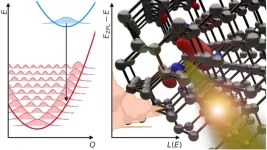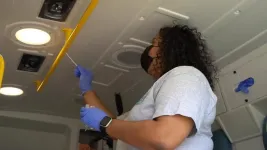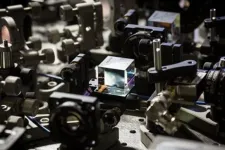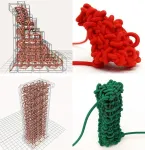(Press-News.org) FAYETTEVILLE, Ark. — Ryan Dickson, an assistant professor of horticulture for the Arkansas Agricultural Experiment Station, has been developing research since 2018 on growing blackberries indoors and recently secured a nearly $750,000 grant to further that work over the next four years.
The experiment station is the research arm of the University of Arkansas System Division of Agriculture and is home to the largest public-sector breeding program for fresh-market blackberries in the United States. The grant comes from the U.S. Department of Agriculture’s National Institute of Food and Agriculture and is part of the Foundational Knowledge of Agricultural Production Systems program within the Agriculture and Food Research Initiative.
“Consumer demand is increasing for fresh-market blackberries, so this work promotes the ability of U.S. blackberry producers to meet domestic demands long-term,” said Dickson, whose research focus is on greenhouse and controlled environment agriculture.
According to the Packer’s Fresh Trends 2024 survey, 33.2 percent of consumers said they purchased fresh blackberries in the past year, compared with past survey results of 25 percent in 2023, 26 percent in 2022 and 28 percent in 2021.
The main issues blackberry growers are facing, Dickson said, include declining yield caused by soilborne pathogens and climate variability, and rising production costs that erode profit margins. Breeding for disease resistance is an option, he noted, but is time-consuming and shouldn’t be relied on solely because it does not solve all the issues farmers are facing.
Dickson’s research aims to develop innovative soilless long-cane production techniques to increase yields, improve fruit quality and enhance the profitability and sustainability of blackberry farming.
“The future sustainability of blackberry production and improved food security requires development of new knowledge and innovative approaches to increase yields,” Dickson said. “It also requires outreach efforts targeting a broad fruit grower audience spanning across food systems.”
Making it an integrated research and extension project, Dickson will work with Amanda McWhirt, extension fruit and vegetable horticulture specialist and associate professor for the Division of Agriculture, to evaluate novel soilless long-cane production techniques. The Arkansas Cooperative Extension Service is the public outreach side of the Division of Agriculture.
Long-cane method
Dickson’s research calls for growing blackberries in soilless substrate containers using the long-cane system. The blackberries are first grown outdoors in containers and trimmed to form long canes for easier management indoors.
Dickson has been testing Arkansas-bred floricane varieties that typically need two seasons to produce fruit. The idea, he said, is to essentially trick plants into feeling like they have gone through a wintertime by keeping them in a walk-in cooler. After this artificial winter, the plants could theoretically be transferred to a warm high tunnel or greenhouse, ready to produce fruit on demand, out of season.
Strawberries, blueberries and raspberries have been grown in substrates for years like this, but not blackberries.
Dickson said the main goals and potential benefits of long-cane blackberry production are increased yields, better fruit quality and consistency, and out-of-season production.
Moving the blackberry industry forward
The project has four main objectives:
Cultivar selection and cultural practices — Researchers will evaluate how different blackberry cultivars and targeted cultural practices influence long-cane yield and fruit quality.
Economic analysis — The project will include breakeven and risk analyses for both long-cane and field-based blackberry systems, identifying key profitability drivers.
Outreach — Rapid and long-term application of research results will be targeted at both small and large operations to ensure wide adoption of successful practices.
Soilless systems — The research will explore how soilless systems can reduce losses from disease and increase yields, ultimately benefiting local and regional economies.
Experiments will be conducted in high tunnels at the Milo J. Shult Agricultural Research and Extension Center in Fayetteville and the Fruit Research Station in Clarksville. The tunnels will be equipped with advanced systems for irrigation and “fertigation,” in which dissolved fertilizers are delivered through irrigation, and plants will be grown in coconut coir substrate. The research will involve collaboration with industry sponsors and the Division of Agriculture's fruit breeding program.
To learn more about Division of Agriculture research, visit the Arkansas Agricultural Experiment Station website: https://aaes.uada.edu. Follow on Twitter at @ArkAgResearch. To learn more about the Division of Agriculture, visit https://uada.edu/. Follow us on Twitter at @AgInArk. To learn about extension programs in Arkansas, contact your local Cooperative Extension Service agent or visit www.uaex.uada.edu.
About the Division of Agriculture
The University of Arkansas System Division of Agriculture’s mission is to strengthen agriculture, communities, and families by connecting trusted research to the adoption of best practices. Through the Agricultural Experiment Station and the Cooperative Extension Service, the Division of Agriculture conducts research and extension work within the nation’s historic land grant education system.
The Division of Agriculture is one of 20 entities within the University of Arkansas System. It has offices in all 75 counties in Arkansas and faculty on five system campuses.
The University of Arkansas System Division of Agriculture offers all its Extension and Research programs and services without regard to race, color, sex, gender identity, sexual orientation, national origin, religion, age, disability, marital or veteran status, genetic information, or any other legally protected status, and is an Affirmative Action/Equal Opportunity Employer.
END
NIFA grant supports innovative blackberry research in Arkansas
•Research on growing blackberries indoors funded to support long-term sustainability
2024-07-30
ELSE PRESS RELEASES FROM THIS DATE:
Bright prospects for engineering quantum light
2024-07-30
(Santa Barbara, Calif.) — Computers benefit greatly from being connected to the internet, so we might ask: What good is a quantum computer without a quantum internet?
The secret to our modern internet is the ability for data to remain intact while traveling over long distances, and the best way to achieve that is by using photons. Photons are single units (“quanta”) of light. Unlike other quantum particles, photons interact very weakly with their environment. That stability also makes them extremely appealing for carrying quantum information over long distances, a process that requires maintaining a delicate state of entanglement for an extended ...
New high-resolution 3D maps show how the brain’s blood vessels changes with age
2024-07-30
HERSHEY, Pa. — Healthy blood vessels matter for more than just heart health. Vascular well-being is critical for brain health and potentially in addressing age-related cognitive decline and neurodegenerative disorders, like Alzheimer’s disease, according to new study led by Penn State researchers. The findings point to an understudied but possible key role the brain’s vascular network — or energy infrastructure — plays in the onset of neurodegenerative disease.
They published their work today (July 30) in Nature Communications.
Using advanced imaging techniques, the team developed maps of a mouse brain that illustrate ...
Genes or environment? A new model for understanding disease risk factors
2024-07-30
HERSHEY, Pa. — Every disease is shaped by a genetic component as well as environmental factors like air pollution, climate and socioeconomic status. However, the extent to which genetics or environment plays a role in disease risk — and how much can be attributed to each — isn’t well understood. As such, the actions individuals can take to reduce their risk for disease aren’t often clear.
A team led by Penn State College of Medicine researchers found a way to tease apart genetic and ...
Study reveals impact of concern about misinformation on Americans’ media consumption habits
2024-07-30
Most Americans are aware of fake news and misinformation. In a new study, researchers from the University of Pennsylvania sought to uncover whether the threat of misinformation drives Americans to seek out news sources that reflect their own political beliefs.
The study, published in the Harvard Kennedy School Misinformation Review, found that Democrats, older individuals, and those with higher education levels are more concerned about misinformation in general and that, compared to Republicans, ...
USF students will swab first responder vehicles through a CDC-funded infection control initiative
2024-07-30
TAMPA, Fla. (July 30, 2024) – University of South Florida students are leading infection control training for fire and emergency medical services personnel as part of a groundbreaking initiative supported by a multi-million-dollar cooperative agreement with the Centers for Disease Control and Prevention.
This fall, student research and project assistants will begin swabbing first responder vehicles, ambulances, fire trucks and equipment to identify pathogen exposure risks and enhance training.
“By working on this aspect ...
Grainger Engineers to lead Illinois Quantum and Microelectronics Park, shape the future of quantum computing
2024-07-30
Today, The Grainger College of Engineering at the University of Illinois Urbana-Champaign joined other partners from around the state in officially announcing its leadership role in the Illinois Quantum and Microelectronics Park. The project – a quantum-focused research and development campus in Chicago – will be managed by a University of Illinois-led organization on behalf of the State of Illinois and Governor J.B. Pritzker.
Advances in quantum information science and engineering, together with next generation microelectronics, promise to transform computing, which underpins much of how our modern society operates. Grainger Engineering Associate Dean for Research ...
Research warns of “systematic weaknesses in jury decisions”
2024-07-30
There are “systemic weaknesses” in the way juries make decisions – and these are likely to be contributing to the conviction of innocent people, failures to convict the guilty, and inequalities, new research warns.
The current legal rules involving procedure and evidence are not consistently designed based on robust evidence about how the juries make decisions, but the system could function better, according to a new book.
Dr Rebecca Helm, from the University of Exeter, outlines how juries are likely to struggle to make effective legal decisions in predictable case types, including cases involving sexual offences in which testimony ...
NYU Tandon School of Engineering and Indian Institute of Technology Kanpur announce seven joint research projects launching their new partnership
2024-07-30
NYU Tandon School of Engineering and Indian Institute of Technology Kanpur (IIT Kanpur) have unveiled their inaugural roster of collaborative research projects, the first such initiatives under the broad partnership that NYU and IIT Kanpur established last year.
The seven projects, jointly led by researchers from each institution, aim to advance innovations across vital scientific fields including cybersecurity, biotechnology, artificial intelligence, robotics, and wireless communications.
NYU and IIT Kanpur announced their initial partnership agreement in September 2023, ...
Study finds genetic variant among people who experience a rare recovery from ALS
2024-07-30
DURHAM, N.C. – Though exceedingly rare, some people diagnosed with amyotrophic lateral sclerosis (ALS) partially or fully recover from the lethal neurodegenerative disease.
A better understanding of this baffling phenomenon, reported in medical literature for at least 60 years, could point to potential new treatment approaches. To that end, researchers at Duke Health and St. Jude’s Research Hospital launched a study of ALS recovery patients and found certain genetic factors that appear to protect ...
Watch ut IKEA: CMU Researchers eye knitted furniture
2024-07-30
Yuichi Hirose has a dream — a dream that someday everyone will have access to a machine capable of knitting furniture.
This machine wouldn't just knit the furniture's exterior fabric, but would use knitting to fashion solid three-dimensional chairs, tables and other objects. Tired of that love seat? Just unravel it and reuse the yarn to knit yourself an ottoman.
This new fabrication technique — first envisioned by Hirose, a robotics Ph.D. student in Carnegie Mellon University's School of Computer Science — is called solid knitting. The idea captured his imagination more than a decade ago. And now, working with a research team headed by James ...
LAST 30 PRESS RELEASES:
Smithsonian planetary scientists discover recent tectonic activity on the Moon
Government censorship of Chinese chatbots
Incorporating a robotic leg into one’s body image
Brain imaging reveals how wildlife photos open donor wallets
Wiley to expand Advanced Portfolio
Invisible battery parts finally seen with pioneering technique
Tropical forests generate rainfall worth billions, study finds
A yeast enzyme helps human cells overcome mitochondrial defects
Bacteria frozen in ancient underground ice cave found to be resistant against 10 modern antibiotics
Rhododendron-derived drugs now made by bacteria
Admissions for child maltreatment decreased during first phase of COVID-19 pandemic, but ICU admissions increased later
Power in motion: transforming energy harvesting with gyroscopes
Ketamine high NOT related to treatment success for people with alcohol problems, study finds
1 in 6 Medicare beneficiaries depend on telehealth for key medical care
Maps can encourage home radon testing in the right settings
Exploring the link between hearing loss and cognitive decline
Machine learning tool can predict serious transplant complications months earlier
Prevalence of over-the-counter and prescription medication use in the US
US child mental health care need, unmet needs, and difficulty accessing services
Incidental rotator cuff abnormalities on magnetic resonance imaging
Sensing local fibers in pancreatic tumors, cancer cells ‘choose’ to either grow or tolerate treatment
Barriers to mental health care leave many children behind, new data cautions
Cancer and inflammation: immunologic interplay, translational advances, and clinical strategies
Bioactive polyphenolic compounds and in vitro anti-degenerative property-based pharmacological propensities of some promising germplasms of Amaranthus hypochondriacus L.
AI-powered companionship: PolyU interfaculty scholar harnesses music and empathetic speech in robots to combat loneliness
Antarctica sits above Earth’s strongest “gravity hole.” Now we know how it got that way
Haircare products made with botanicals protects strands, adds shine
Enhanced pulmonary nodule detection and classification using artificial intelligence on LIDC-IDRI data
Using NBA, study finds that pay differences among top performers can erode cooperation
Korea University, Stanford University, and IESGA launch Water Sustainability Index to combat ESG greenwashing
[Press-News.org] NIFA grant supports innovative blackberry research in Arkansas•Research on growing blackberries indoors funded to support long-term sustainability






